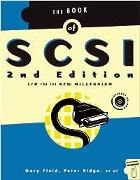Read more
SCSI is a hardware interface that allows fast communication between devices connected to a computer, such as scanners, Zip drives, and CD-ROM drives. This book gives users simple guidelines for using SCSI on a PC and complete instructions on maintaining a SCSI system.
Additional text
This thoroughly updated second edition of The Book of SCSI provides down-to-earth instructions for installing, implementing, utilizing, and maintaining SCSI on a PC. Accessible to readers at all levels, this is the standard reference for anyone working with or maintaining a SCSI system. Along with complete coverage of SCSI-3 and all the latest features, The Book of SCSI: I/O for the New Millennium contains many new and updated features. What's new? New and expanded sections on ASPI programming including a sample utility program
A new chapter on SCSI device drivers
A CD-ROM with SCSI diagnostic tools and utilities, a searchable copy of the book for quick referencing and the SCSI FAQ, SCSI Quick Start Guide, and SCSI Game Rules
Coverage of Ultra2/LVD (Low Voltage Differential), Fibre Channel, RAID, DVD, and more
New directions in the SCSI and storage industry
A chapter on SCSI test equipment
Many new drawings and diagrams of the multitude of SCSI connectors
A comprehensive troubleshooting guide
And of course, in addition to the above additions and improvements, you'll find the features that made the first edition of The Book of SCSI the standard reference on SCSI:
Plain English explanations of the basics of SCSI: how to work with SCSI IDs, LUNs, termination, parity checking, asynchronous and synchronous transfer, bus mastering, caching, and more.
Specific instructions on how to add SCSI to your PC that will save you hours of frustration.
An understandable explanation of how the SCSI bus works
The ASPI programming spec. from Adaptec, Inc.
Clear, uncomplicated drawings and diagrams showing various aspects of SCSI hardware systems.
Tips, tricks, and troubleshooting help for SCSI systems.
An extensive glossary of SCSI terms and a comprehensive index.

